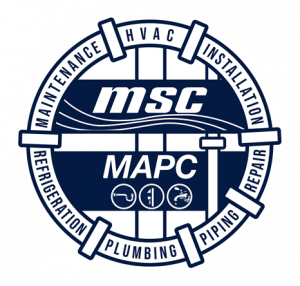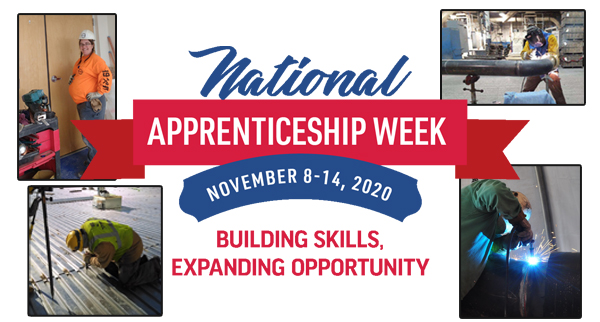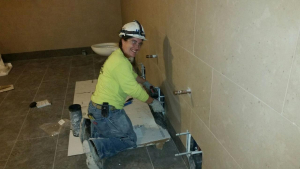What is an Apprenticeship?
Governor Tony Evers proclaimed the week of November 8-14, 2020, as Apprenticeship Week in Wisconsin, in accordance with National Apprenticeship Week. Throughout the week, the Department of Workforce Development’s Bureau of Apprenticeship Standards will be holding virtual events and activities to encourage apprenticeship training and celebrate the positive impact on Wisconsin’s economy.
What exactly is an apprenticeship, and why should you be interested in participating in one? According to Wisconsin’s Department of Workforce Development’s website:
“Registered apprenticeship offers numerous benefits to both employers and jobseekers. Apprenticeship is post-secondary education like a college or university. But there’s a big difference. Apprentices learn only a portion of their skills in a traditional classroom. They receive most of their training on-the-job, while working for an employer who pays a good wage. The employment is the primary requirement for an apprenticeship – a job must exist for the apprentice to be trained.”
The Madison Area Mechanical and Sheet Metal Contractors Association (MSC) and Madison Association of Plumbing Contractors (MAPC) promote Union Apprenticeships in the trades of Sheet Metal, Steamfitting, and Plumbing.
Starting a career as a Union Apprentice gives individuals the opportunity for equal pay regardless of their ethnicity, gender, age, religion, sexuality, or disability; insurance and retirement benefits; a referral to a hiring hall; continual training post-apprenticeship; and contractors have the best safety practices in place on job sites. Apprentices also start earning livable wages from day one of their apprenticeship. While students who take the traditional college route are in class and collecting debt that they will pay off for years to come, apprentices are getting paid to both work and attend school. Following their five-year apprenticeship, apprentices test with the state to become Journeyworkers and are debt-free. In-classroom training is paid as you go through your apprenticeship. The beginning salary for Journeyworkers in all three trades: plumbing, sheet metal, and steamfitting, is roughly $25,000 per year higher than that of the typical college graduate.
Another perk of pursuing an apprenticeship is this is just the start to an influential career pathway in the trades. Many apprentices continue with their tradesmen careers to become foremen, estimators, CAD Designers, Project Managers, Inspectors, and so much more! An apprenticeship in the trades is just a steppingstone to so many possibilities. Some apprentices aspire to be business owners as well!
As mentioned, contractors that are part of MSC and MAPC hire apprentices in the fields of plumbing, sheet metal, and steamfitting. What exactly do these apprenticeships and careers entail?
Plumbing Apprenticeship
The Plumbing Apprenticeship Program is five-year “earn as you learn” program, with 8,000 hours of on-the-job training and 572 hours of paid-related instruction. There is an additional 260 hours of unpaid related instruction. Once you complete your five-year apprenticeship including the classroom training and on-the-job hours, you take the state Journeyworker exam to become a licensed Journeyworker.
No previous experience is needed. A person wishing to enter this professional trade must be able to understand detailed written and verbal communication. They should also enjoy working with their hands and be able to solve math problems quickly and accurately. The starting salary for first year plumbing apprentices is $18.65 and the current Journeyworker wage is $46.62.
What Do Plumbers Do?
* • Install piping for water, gas, sewage, and drainage systems.
* • Install sanitary fixtures in facilities such as restrooms and kitchens.
* • Install medical gas and specialty piping systems for commercial, health, and industrial applications.
* • Run tests on installations to make sure they are operating properly.
* • Service and repair existing plumbing systems.
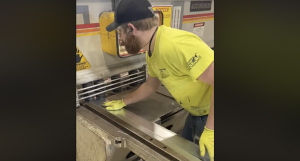 Sheet Metal Apprenticeship
Sheet Metal Apprenticeship
The Sheet Metal Apprenticeship Program offers two “earn as you learn” programs – Sheet Metal and EST (Environmental Service Technician). Both are five-year programs with 9,000 hours of on the job training and 504 hours of paid-related instruction. There is an additional 420 hours of unpaid related instruction. Once you complete your five-year apprenticeship including the classroom training and on-the-job hours, you take the Journeyworker exam to become a Journeyworker.
No previous experience is needed. A person wishing to enter this professional trade must be able to work under the direct supervision of a skilled Journeyworker. They should also enjoy working with their hands with a good working knowledge of math. The starting salary for first year apprentices is $21.01 and the current Journeyworker wage is $42.02.
What Do Sheet Metal Workers Do?
* • Fabricate and install heating and air conditioning systems for offices, stores, homes, and industrial buildings.
* • Fabricate and install exterior building ornamentation, gutters, flashings, and metal roofs.
* • Fabricate and install industrial fume removal systems, waste material and collection systems, and boiler breaching systems.
* • Fabricate and install kitchen equipment, counters, hoods, tables, cabinets, and specialty items.
Steamfitter Apprenticeship
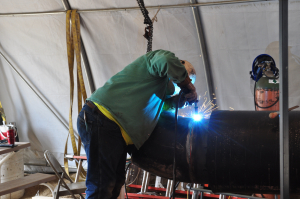 The Steamfitter Apprenticeship Program offers two “earn as you learn” programs – Construction and Refrigeration/Service. Both are five-year programs with on the job training, paid-related instruction, and unpaid-related instruction. Once you complete your five-year apprenticeship including the classroom training and on-the-job hours, you take the Journeyworker exam to become a Journeyworker.
The Steamfitter Apprenticeship Program offers two “earn as you learn” programs – Construction and Refrigeration/Service. Both are five-year programs with on the job training, paid-related instruction, and unpaid-related instruction. Once you complete your five-year apprenticeship including the classroom training and on-the-job hours, you take the Journeyworker exam to become a Journeyworker.
No previous experience is needed. A person wishing to enter this professional trade must enjoy working with their hands and be able to understand detailed written and verbal communication. The starting salary for first year apprentices is $22.29 and the current Journeyworker wage is $49.53.
What Do Steamfitter Do?
Steamfitters assemble, install, alter, and repair pipelines or pipe systems that carry water, steam, compressed air, liquids, and gases required for processing, manufacturing, heating, and cooling. They install piping and tubing made of carbon steel, copper, plastic, glass, or other metals using a variety of processes including brazing, welding, screwing, gluing, bending, and mechanical joints. Work includes installation of heating and cooling equipment and mechanical control systems.
All three of these trades are excellent career paths for individuals who like to work with their hands. An apprenticeship gives you the opportunity to have a great career that can provide for your family and give you financial stability.
During National Apprenticeship Week 2020, we will be sharing stories of some of our current apprentices in the plumbing, sheet metal, and steamfitting trades. These apprentices will share how their choice of becoming a tradesman and tradeswoman has helped them support their family, given them a successful career, helped them follow in their father’s footsteps, and so much more!
For information on how you can apply for a plumbing, sheet metal, or steamfitting apprenticeship with MSC and MAPC, visit http://www.mechanicalindustries.org/.
